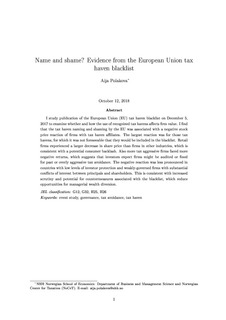| dc.description.abstract | I study publication of the European Union (EU) tax haven blacklist on December 5, 2017 to examine whether and how the use of recognized tax havens affects firm value. I find that the tax haven naming and shaming by the EU was associated with a negative stock price reaction of firms with tax haven affliates. The largest reaction was for those tax havens, for which it was not foreseeable that they would be included in the blacklist. Retail firms experienced a larger decrease in share price than firms in other industries, which is consistent with a potential consumer backlash. Also more tax aggressive firms faced more negative returns, which suggests that investors expect firms might be audited or fined for past or overly aggressive tax avoidance. The negative reaction was less pronounced in countries with low levels of investor protection and weakly-governed firms with substantial conflicts of interest between principals and shareholders. This is consistent with increased scrutiny and potential for countermeasures associated with the blacklist, which reduce opportunities for managerial wealth diversion. | nb_NO |
